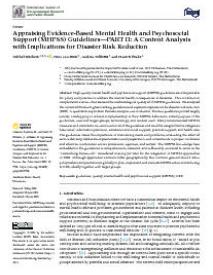Appraising Evidence-Based Mental Health and Psychosocial Support (MHPSS) Guidelines—PART II : A Content Analysis with Implications for Disaster Risk Reduction
High quality mental health and psychosocial support (MHPSS) guidelines are indispensable for policy and practice to address the mental health consequences of disasters. This contribution complements a review that assessed the methodological quality of 13 MHPSS guidelines. We analyzed the content of the four highest-ranking guidelines and explored implications for disaster risk reduction (DRR). A qualitative explorative thematic analysis was conducted.
The four guidelines proved largely similar, overlapping or at least complementary in their MHPSS definitions, stated purpose of the guidelines, user and target groups, terminology, and models used. Many recommended MHPSS measures and interventions were found in all of the guidelines and could be assigned to five categories: basic relief, information provision, emotional and social support, practical support, and health care. The guidelines stress the importance of monitoring needs and problems, evaluating the effect of service delivery, deliberate implementation and preparation, and investments in proper conditions and effective coordination across professions, agencies, and sectors. The MHPSS knowledge base embedded in the guidelines is comprehensive, coherent, and sufficiently universal to serve as the “overarching framework” considered missing yet vital for the integration of MHPSS approaches in DRR. Although application contexts differ geographically, this common ground should allow policymakers and practitioners globally to plan, implement, and evaluate MHPSS actions contributing to DRR, ideally together with target groups.
In: International Journal of Environmental Research and Public Health ; ISSN: 1660-4601 | 19 | 13 | 7798
https://doi.org/10.3390/ijerph19137798


